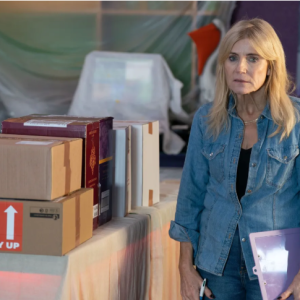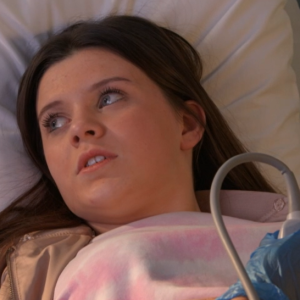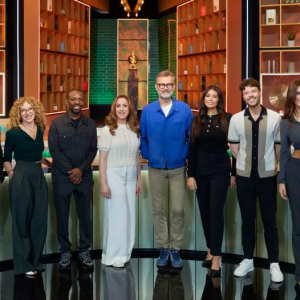
The world of theatre and television is mourning the passing of Frank Barrie, who has died at the age of 88. While many “EastEnders” fans will fondly remember his brief yet memorable stint as Dot Cotton’s (June Brown) gentleman friend, Edward Bishop, Barrie’s career was far more extensive and extraordinary, marked by a prolific list of theatre credits, over 150 screen appearances, and a truly global reach with his iconic one-man show, Macready! His life was a testament to a passion for performance, beginning with a childhood fascination that led to a dramatic, unexpected stage debut.
Frank Barrie’s “EastEnders” appearance was a heartwarming surprise for viewers during the Christmas 2010 season. He arrived in Albert Square as Edward Bishop, the dignified leader of the local church choir. His introduction came as he was diligently collecting money for the church organ, a mission that serendipitously led him to meet the legendary Dot Cotton, who, at the time, was still married to Jim Branning. What ensued was a delightful, almost “Brief Encounter”-style romance that blossomed amidst the mundane realities of Walford life. Edward would deliver Jim’s meals-on-wheels, providing stolen moments of connection and budding affection with Dot. However, like many fleeting romances in the Square, it eventually came to an end when Dot, true to her complex nature, ultimately told him “to be gone.” This brief but impactful storyline showcased Barrie’s ability to create a charming and poignant character, even in a limited role, leaving a lasting impression on millions of “EastEnders” viewers.
Barrie’s journey to the stage began early. Born in Scarborough, North Yorkshire, on September 19, 1936, and raised in York, he recalled being utterly “thrilled” as a four-year-old by a local variety show: “There was somebody on stage singing Chattanooga Choo-Choo in a spotlight with an orchestra… I remember the tremendous feeling of excitement.” This early spark ignited a lifelong passion. He was a regular at the theatre as a boy, already diligently “making notes on the performances.”
His path to becoming an actor took a remarkably serendipitous turn the summer before he was due to start university. Needing a job, he boldly approached his local theatre and knocked on the stage door. In a stroke of extraordinary luck, the theatre’s director himself opened the door, en route to summarily dismiss an actor who was struggling to learn his lines for an upcoming play about a pools-winner, set to open in mere days. The director’s terse “What do you want?” was met with Barrie’s confident, youthful reply: “I want to be an actor.” When asked if he could “learn lines quickly,” Barrie emphatically declared, “Yes!” – a testament to the “confidence of youth,” as he later recalled. Impressed, the director took him into his office, ran through the part, and Barrie made his professional stage debut that very Monday.
After this unexpected start, Barrie pursued formal education, enrolling at Hull University, where he studied English and philosophy. He excelled academically, even becoming president of the Debating Society and winning the national student competition. He spent his university vacations diligently working back at the theatre in York, honing his craft.
Upon graduating, Barrie honed his skills in repertory theatre for several years, interspersed with occasional television parts, including four episodes of Emergency Ward 10. His talent soon led him to the prestigious Bristol Old Vic, where he rapidly rose to become their youngest leading man. In 1966, he played Lucio in Measure for Measure, Tyrone Guthrie’s inaugural production for Bristol, marking a significant milestone in his career.
His performance as Richard II at the Bristol Old Vic caught the discerning eye of none other than Laurence Olivier, who promptly invited Barrie to join the esteemed National Theatre. Barrie, naturally, expected profound “pearls of thespian wisdom” from the legendary Olivier. He recalled a particular instance while appearing in White Devil when he sought guidance: “I said to him: ‘I don’t know what to do with this line. What shall I do with it?’ And this was his advice: ‘Well, baby’ – he calls everybody baby – ‘Well, baby, if you don’t know what to do with the line you’d better not do anything.’ ” This anecdote perfectly encapsulates Olivier’s famously pragmatic, yet impactful, approach to acting.
Barrie’s tenure at the National Theatre (mostly at the New Theatre and Old Vic while the Southbank home was under construction) was prolific and critically acclaimed. His roles included: Ganya in Simon Gray’s 1970 adaptation of Dostoevsky’s The Idiot, where he gave “a sharp character sketch” (Telegraph); the aristocrat Barelli in Pirandello’s The Rules of the Game (1971); the romantic Desmoulins in Buchner’s Danton’s Death (also 1971); and, in the same year, Bassanio in Jonathan Miller’s Merchant of Venice.
He consistently garnered glowing reviews throughout his career. In 1974, his portrayal of Oberon in A Midsummer Night’s Dream at the Open Air Theatre in Regent’s Park was highly praised: “Oberon and Titania are given full and refreshingly sensuous authority by Frank Barrie and Linda Thorson,” wrote Eric Shorter in the Telegraph. Shorter further complimented, “Mr Barrie’s speaking is a special pleasure and he cuts a figure of such masculine dash that he might be posing for the cover of Playgirl.” His performance as the titular butler in the 1977 revival of JM Barrie’s The Admirable Crichton (Greenwich), opposite Gayle Hunnicutt, drew accolades from Keith Nurse in the Telegraph: “Frank Barrie gives every impression that beneath the stiff butler’s uniform there beats the heart of a true, intelligent being.” The following year, his Lord Goring in Oscar Wilde’s An Ideal Husband at the Greenwich Theatre was lauded for its “satisfactorily dry smugness.”
In 1981, Barrie achieved international recognition with Macready!, his highly successful one-man show about the celebrated Victorian actor William Macready. The show opened in New York before transferring to the West End. Eric Shorter found it “richly informative and sometimes thoughtful, even touching,” and Barrie was honored with the best actor award at the London Critics Plays and Players Awards. Macready! went on to tour in more than 60 countries, including representing Great Britain at the 1982 Commonwealth Games Arts Festival in Australia, and Channel 4 aired an adaptation in 1983, bringing his powerful performance to a wider audience.
That same year, he played Eglamour in the BBC TV adaptation of Shakespeare’s The Two Gentlemen Of Verona. However, perhaps his most astonishing and memorable engagement was a Shakespeare production that was shockingly cancelled after only two nights: his staging of Macbeth in Baghdad during the first Gulf War. Barrie recalled the surreal experience: “Before we could perform it to the public we had to get approval from the censors.” He noted the irony of performing a play about “a murderous tyrant who kills his own people” under Saddam Hussein’s regime, yet, surprisingly, approval was granted.
The initial performances were remarkable. “The first performance was quite extraordinary,” Barrie remembered. “It went terribly quiet during the show and then there was terrific applause at the end. The next performance there was a full house and people waiting outside.” He again observed, “Something seemed to happen to the audience. It just went terrifically quiet, and then deafening applause at the end.” However, the cultural impact was too potent. The morning after the second performance, the British ambassador delivered the stark news: “We were told the secret police had been in the audience and that the rest of the season was cancelled.” This chilling anecdote underscores the power of theatre to resonate even in oppressive regimes.
Barrie maintained a prolific output throughout his life, including playing the famously bibulous columnist in Jeffrey Bernard is Unwell on stage (1995). His extensive television work included roles in Howard’s Way (1986) and Murder in Suburbia (2005). He also featured in the popular 2003 film Calendar Girls, playing a lecherous photographer.
In 2005, he showcased his writing talents with the comedy The Devil You Know! (first performed at the Warehouse Theatre in Croydon), a play inspired by a curious letter in an agony column from a woman planning to introduce her ex-lover to her husband. In 2008, he received rave reviews for Lunch With Marlene, a two-hander written by Chris Burgess, co-starring Kate O’Mara at the New End Theatre, Hampstead. The play depicted a fictional meeting between Marlene Dietrich and Noël Coward. Dominic Cavendish in the Telegraph lauded Barrie’s performance: “Barrie’s Coward, overly saucy with the waiter, is elegant and smooth as a neatly folded table-napkin… Hands forming debonair shapes in the air, Barrie so beautifully catches the Master’s conspiratorial rat-a-tat-tat delivery that he almost demands a spin-off show in his own right.”
Beyond his acting, Barrie also served as a drama and speech examiner for Trinity College, London, assessing students globally. He is survived by his wife Mary, whom he met at Hull University, and their daughter Julia Barrie, who followed in her father’s theatrical footsteps.
Frank Barrie, born September 19, 1936, passed away on June 30, 2025. His legacy is one of remarkable talent, versatility, and an unwavering dedication to his craft, leaving an indelible mark on both the stage and screen.
👉 What is your most memorable moment of Frank Barrie’s performance as Edward Bishop in “EastEnders”? And which of his incredible stage achievements, like Macready! or the Baghdad Macbeth, do you find most fascinating? Share your thoughts below! 👇





